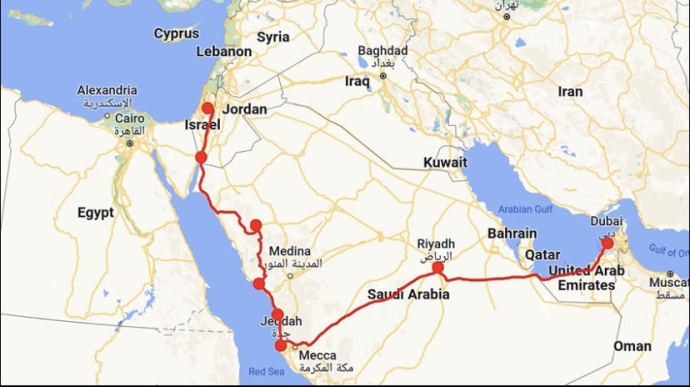For some immigrants (from the US at least), living in Israel has a disappointing lack of options for a truly monumental road trip.
Bruce Gurfein, a Jewish-American serial entrepreneur based in the United Arab Emirates, might have found an alternative, this month he finished a 4,000-plus km. road trip from Dubai to Israel and back again, in a brilliant combination of business and pleasure.
Having first visited the UAE in 1997, Gurfein began the latest chapter of his career in the country when he became involved in an Emirates-based project related to cameras to catch speeders and traffic enforcement involving a lot of Israeli tech.
Following the success of that project, Gurfein remained involved in the UAE-Israeli business arena, including with his current project: Future Gig – a start-up accelerator founded to unite agri-tech projects from the UAE, Saudi Arabia, Jordan, Bahrain, the Palestinian territories and Israel.
It was for the sake of promoting this accelerator that Gurfein needed to meet in those countries. But the decision to forego an airplane in favor of a Nissan Armada was his idea of a fun twist.

You’re one of the pioneers of “The Great Middle Eastern Road Trip.” What countries did you stop in along the way, and what made you decide to go on such a cool trip?
“A friend of mine and I drove from Dubai to Israel and back. On the way there, we went through Saudi Arabia and Jordan, on the way back we visited Palestine, Iraq, Saudi Arabia and Bahrain. The idea was a combination of a few things. Firstly, it was fun. No one’s ever done it before. But the idea was to actually help launch the accelerator and meet with both farmers and companies on the way, and get to little parts of the region that we would have never made it to if we were just continuously flying back and forth.”
Did you encounter any issues on the road in any of the countries?
“We almost ran out of gas... but that was purely the fact that there was a very long distance between one gas station and the other. From a political point of view though, we had no issues anywhere. We were welcomed, it was pleasant. We actually didn’t hide the fact that we were Jewish, either. We told people we were Jewish. We told people we were heading to Israel and had no issues. People were more interested in the technology we had to sell versus where we were coming from or where we were going.”
Tell me more about what it is that you’re selling
“At the moment, we’re in the process of setting up an accelerator that is helping a few different companies – Israeli and otherwise – within the climate and desert tech [field]. We’ve launched a few beta sites for them in the UAE, and in Saudi Arabia and Iraq. On the basis of this accelerator, the companies are going to come out on the other end more successful.
“They’re going to be brought into our earlier stage – maybe ‘round A’ – once they have a proven product, and we’re going to be investing into them at their later stages and in their development and their marketing within the region, possibly even manufacturing for some of them that are willing to move their manufacturing to the region.
“On that note, I was happy to see that the Israeli Agriculture [and Rural Development] Ministry published a tender last week for a permanent representative in the UAE for the agro sector, because that’s a sector that’s going to have a lot of growth in the region and there’s a lot for both parties to learn from each other.”
It’s my understanding that you’ve been selling Israeli technology in the Middle East – namely in the UAE – for a while. Two years ago the Abraham Accords were ratified, normalizing business relations between the UAE and Israel, which has since caused a rapidly tightening relationship to bloom between the two countries.
What was it like to work in the UAE both before and after the Accords? Were there any major differences before and after?
“So the basic change was that the flight from one to the other became much shorter. You no longer had to fly through Jordan or through another destination. Also, that you were now able to send money directly with the bank, and that they released the 972 area code. Really, it was the fact that you no longer had to hide to do business. It was suddenly open and out in the air, ‘Hey, we’re coming.’
“The Abraham Accords has made it much easier because now, a lot of these companies no longer have to disguise themselves as Cypriot or Dutch or French companies coming in, but can come in directly as Israeli – and then use the Emirates as a place to disguise themselves before they move into some of the other countries in the region.”
“The Abraham Accords has made it much easier because now, a lot of these companies no longer have to disguise themselves as Cypriot or Dutch or French companies coming in, but can come in directly as Israeli – and then use the Emirates as a place to disguise themselves before they move into some of the other countries in the region.”
Bruce Gurfein
